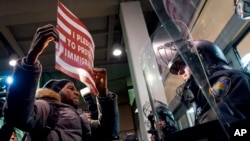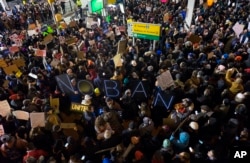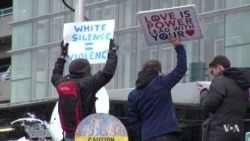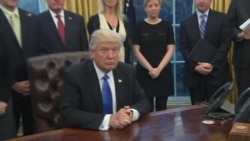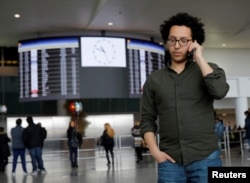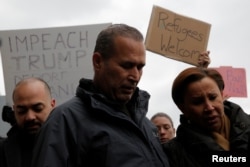Several people have been detained at U.S. airports and others have been barred from boarding flights destined for the U.S., according to U.S.-based lawyers and international airport officials, as an executive order signed Friday by President Donald Trump restricting travel from certain countries begins to take hold.
The executive order took effect Friday night, banning citizens of seven majority-Muslim countries and stranding some at airports mid-journey. The New York Times reported that lawyers had already taken legal action on behalf of two Iraqi refugees, one of which was still being held at New York's John F. Kennedy International Airport.
The lawyers also requested a process that would extend the lawsuit to include all refugees who said they were being illegally detained at U.S. airports.
The lawyers, who were working with the International Refugee Assistance Project and other civil rights groups, told the Times that one of the men, Hameed Khalid Darweesh, who has since been released, worked with the U.S. government in Iraq for 10 years, and the other was traveling to America to join his wife and young son, who already live here.
WATCH: Trump Immigration Order Sparks Protests at NY Airport
'A total shock'
"We've never had an issue once one of our clients was at a port of entry in the United States," lawyer Mark Doss told the Times. "To see people being detained indefinitely in the country that's supposed to welcome them is a total shock."
Darweesh spoke to reporters upon his release at the airport. When asked his thoughts on Trump, Darweesh said: "I like him. But I don't know. This is a policy I don't know. He is a president. I'm a normal person."
Abed Ayoub, a lawyer with the American-Arab Anti-Discrimination Committee, said there were 11 people being detained at JFK. He also said he knew of others being detained at airports in Atlanta, Houston and Detroit.
WATCH: Trump: 'It's not a Muslim ban'
"There are individuals at other airports where this is happening," he said, though he didn't have an exact number.
Officials at the Cairo airport in Egypt said an Iraqi family had been barred from boarding a plane destined for New York because of the new regulations.
When the flight manifest was sent to JFK Airport in New York, officials there responded with instructions not to let the family — a man, his wife and two children — on the EgyptAir flight.
Qatar Airways told its customers from the seven countries they would need either a green card — indicating legal permanent residency — or a diplomatic visa in order to board a flight destined for the U.S.
Paul Callan, a CNN legal analyst and former New York City prosecutor, told VOA that refugees and others could legally be blocked from entering the U.S., but once they arrived on U.S. soil, dealing with them became more difficult because they were protected by the U.S. Constitution.
"You can block people from coming into the country. But once they're in, all persons have constitutional protections if they're in the United States, and certainly if there is a claim that those constitutional rights are being violated by an executive order, that claim would go to the U.S. Supreme Court. So I think we'll see a lot of litigation on this issue," he said.
Anthony Romero, the executive director of the American Civil Liberties Union, said Trump's order violated the Constitution's ban on religious discrimination because it barred immigration from Muslim-majority countries.
" 'Extreme vetting' is just a euphemism for discriminating against Muslims," he said.
State Department guidance
VOA asked the State Department what guidance it was providing to those refugees in transit to the U.S. or green card holders who might currently be out of the country. A spokesman responded that the department was working to put the executive order into effect and that the "safety and security of the American people always comes first."
"We take seriously our responsibility to safeguard the American public while remaining committed to assisting the world's most vulnerable people," State Department spokesman Mark Toner said.
Gillian Christensen, a spokeswoman for the Department of Homeland Security, told Reuters that the Trump executive order "will bar green card holders."
In addition to barring residents of Iraq, Syria, Iran, Sudan, Libya, Somalia and Yemen from entering the U.S. for 90 days, the executive order permanently banned admission of Syrian refugees and placed a 120-day ban on all other refugees entering the U.S.
The president said Friday that only people who supported the United States should be allowed into the country. The executive order he signed discussed identification and verification procedures that U.S. consular officers should use in extensive detail, he said.
"We want to make sure that we are not admitting into our country the very threats our soldiers are fighting overseas," Trump said. "We only want to admit those into our country who will support our country and love deeply our people."




